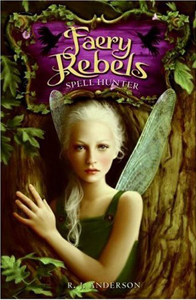| ________________
CM . . .
. Volume XV Number 18. . . .May 1, 2009
excerpt:
Faery Rebels: Spell Hunter is the story of a fairy named Bryony who lives in a great oak along with a dying and fearful society of fairies who have lost their magic. Dependant on the magic of one individual, a Queen they hide in the tree-world they call Oakenwyld. Like all adolescents, Bryony is restless and wants to experience life outside the confines of the tree. In fact, being daring and bold, she goes outside against her guardian's directive and finds a human boy, a baby. When she grows older, she meets the baby again as a grown young man. When given a role to play in her society, Bryony becomes an apprentice hunter for the Queen and the fairy community. When Bryony is assigned to provide protection for those fairies that leave the tree to scavenge for food, readers get a glimpse of the dangers of the world from the perspective of one so small a bird could eat her. But Bryony is brave and daring and takes on her role with a courageous heart. She even assumes a new name, Knife, as a symbol of her rebellious attitude against custom and tradition. One day, Knife encounters the same boy, now, a young man crippled and in a wheel chair. Using some magic she didn't know she had, she rescues him from suicide. The two become friends, and Knife discovers more about life in the human world. R. J. Anderson has written a beautiful and complex story in the subgenre of faerie fantasy which may, in time, rival the vampire theme in books for this age. The author has added a few original twists to the conventions of the fairy story to make it modern and allow the reader an easy "suspension of disbelief." True to conventional expectations, the girl and the boy must ultimately prove their love. The experienced of fantasy will not be disappointed as the author carefully employs other conventions in ways which fit the plot naturally.
Highly Recommended. Janet Johnson teaches Children's and Young Adult Literature in the Library Technician program at Red River college in Winnipeg, MB. She used to be a librarian in a school.
To comment
on this title or this review, send mail to cm@umanitoba.ca.
Copyright © the Manitoba Library Association. Reproduction for personal
use is permitted only if this copyright notice is maintained. Any
other reproduction is prohibited without permission.
NEXT REVIEW |
TABLE OF CONTENTS FOR THIS ISSUE
- May 1, 2009.
AUTHORS |
TITLES |
MEDIA REVIEWS |
PROFILES |
BACK ISSUES |
SEARCH |
CMARCHIVE |
HOME |
